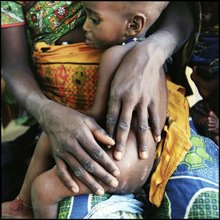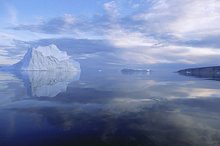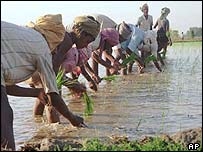PREAMBLE: In this issue we abstract an article carried by The Economist (on-line edition Sept 24th, 2007). The article reported on Ugandan President, Yoweri Museveni's declaration that climate change is an act of aggression by the rich world against the world’s poor. We also note, on the same topic, the following statement from the Church World Service (CWS): "The issue for CWS is how climate change frames development and justice", said Rajyashri Waghray, who directs education and advocacy for the CWS.
For stark contrast we note Canada’s uncertain posture, now quoted from a Globe and Mail Editorial of September 26: “Prime Minister Stephen Harper’s progress from a climate-change skeptic to an environmental convert has been a perplexing odyssey. After a half-hearted attempt to tackle greenhouse-gas emissions late last year, his Conservative government hurriedly introduced new regulations and incentives, which made a good start in fostering reductions. Earlier…(in September), in Australia, he even announced his personal commitment to ‘careful environmental stewardship’. That seemed heartfelt. Now it is fair to question the sincerity of that conversion. On… (Sept 24), at a UN climate change conference aimed at saving the Kyoto Protocol, Mr Harper announced that Canada had asked to join a rival climate-change pact, the Asia-Pacific Partnership. The six members of that pact include nations that have refused to ratify the protocol, such as the United States, and others among the world’s worst polluters, such as India and China. Together they account for nearly half of all greenhouse gas emissions”.
And now The Economist’s discussion of the Ugandan Prime Minister’s proposition, and their assessment of the situation and implications in Africa...
CLIMATE CHANGE AS AN ACT OF AGGRESSION
At a recent African Union summit, Uganda's president, Yoweri Museveni, declared climate change an act of aggression by the rich world against the world’s poor. Indeed, if predictions of the UN's Intergovernmental Panel on Climate Change (IPCC) hold true, climate change may have a graver effect on Africa than on any other continent. One may well ask…Why should the poorest die for the continued excesses of the richest?
According to The Economist, the IPCC's most recent regional report raises the spectre of rising mortality. It predicts a minimum 2.5°C increase in temperature in Africa by 2030; drylands bordering deserts may get drier, wetlands bordering rainforests may get wetter. The panel suggests the supply of food in Africa will be “severely compromised” by climate change, with crop yields in danger of collapsing in some countries.
In the drylands, water may become a critical issue. Soaring temperatures and erratic rainfall may dry up surface water. Between 75m and 250m Africans, out of the 800m or so now living in sub-Saharan Africa, may be short of water. The soil will hold less moisture, bore-holes will become contaminated, and women and girls will have to walk ever greater distances to fetch water. Vegetative cover will recede. The IPCC guesses that 600,000 square kilometres (232,000 square miles) of cultivable land may be ruined.
Warming may also hurt animal habitats and biodiversity. More algae in freshwater lakes will hit fishing. The glaciers of Uganda's Rwenzori mountains, of Tanzania's Kilimanjaro and of Kenya's eponymous mountain may disappear; only 7 of the 18 glaciers recorded on Mount Kenya in 1900 still remain. At the same time, a likely rise in sea levels may threaten the coastal infrastructure of northern Egypt, the Gambia, the Gulf of Guinea and Senegal.
There are two caveats to this gloomy scenario: 1) some parts of Africa may benefit from climate change. Increased rainfall in highland areas in eastern Africa could, for example, be beneficial. 2) though climate-change models have improved, they have been unreliable in Africa; the detail is guesswork.
Still, states The Economist, some scientists think that climate change may be even crueler to parts of Africa than the IPCC predicts. The important point, they say, is not the degree of warming but the continent's vulnerability to it. A University of Pretoria study estimates that Africa might lose $25 billion in crop failure due to rising temperatures and another $4 billion from less rain. The already impoverished drylands would suffer most. Some cite the war in Sudan's Darfur region as proof of the damage done by climate change, soil erosion and overpopulation.
Unfortunately, in the opinion of The Economist, few African leaders have grasped the scale of the challenge... Most oil-producers have squandered their bonanza. Nigeria has failed to plan for how to stem the dreadful pollution in its oil-producing Delta region or to prevent desertification tearing at the fabric of its dry Muslim north. South Africa is only just beginning to own up to its coal addiction. Uganda's Mr Museveni is fighting off a rare insurrection from his supporters against plans to turn a piece of Ugandan rainforest over to farming. The World Meteorological Organisation says that weather-data collection in Africa has recently got worse, just as the need for accurate figures has grown; many of the automatic weather stations it helped set up have fallen into disrepair. The African Union has done little to sound the climate-change alarm.
Kenya's president, Mwai Kibaki, says that Africa should “join hands” with its friends in the rich world over climate change. He wants more carbon-trading projects to come to Africa; so far, most have gone to Asia. His advisers admit that Mr Kibaki's ambitious plan to turn Kenya into an industrial country by 2020 worries environmentalists, but say that reforestation, thermal power and better management of water and grazing would, if they materialized, offset the damage.
Africa emits far less carbon than other continents, so its recently faster-growing economies do not gravely menace its environment. Some rich-country consumers, however, want to punish African countries for air freighting northwards some of their produce, from flowers to wine.
Hardier new varieties of staple crops, drip irrigation schemes and technologies such as solar power should help Africa adapt to climate change. But so can simple shifts in policy. For instance, a government decision in Burkina Faso to let farmers own the trees on their land has increased the country's tree cover.
The Economist’s conclusion: As the G8 rich countries are failing so far to fulfill the promises they made in 2005 to boost aid to Africa, the continent should not expect much new money to protect the environment. In the short run, Africa's own politicians need to take a lead, even if the people most culpable for the damage done by climate change live elsewhere.
Sources:
. Church World Service and partners prepare to act on climate change. May 2, 2007. http://www.churchworldservice.org/Educ_Advo/news/2007/climatechange.html
. Globe and Mail. Lead Editorial. Sept 26, 2007.
. Economist.com. Global Warming in Africa – drying up and flooding out. Sept 24, 2007. http://www.economist.com/world/africa/displaystory.cfm?story_id=9163426
COMMENT: What is important about the contrasting viewpoints presented, from those of President Museveni, to the Church World Service, The Economist, to the anti-Kyoto stance of Prime Minister Harper and the Asian-Pacific partnership, is that ultimately they highlight climate change as an ethical issue that almost inevitably will come up as a focus for discussion at the UN negotiations on climate change scheduled for Bali in December.
FROM a Great Canadian and World Statesman
"A great gulf... has... opened between man's material advance and his social and moral progress, a gulf in which he may one day be lost if it is not closed or narrowed..."
Lester B Pearson
http://nobelprize.org/nobel_prizes/peace/laureates/1957/pearson-lecture.html
Monday 1 October 2007
Subscribe to:
Posts (Atom)
INSPIRATIONAL WELCOME ............................... from T.S.Eliot's "Little Gidding"
If you came this way From the place you would come from... It would be the same at the end of the journey...
If you came, not knowing what you came for, It would be the same... And what you thought you came for Is only a shell, a husk of meaning... From which the purpose breaks only when it is fulfilled If at all.




















